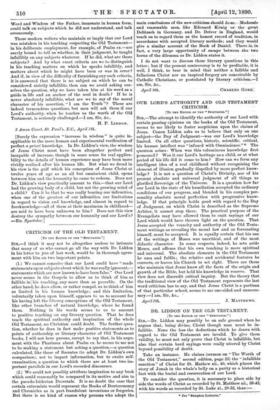OUR LORD'S AUTHORITY AND OLD TESTAMENT CRITICISM.
[To THE EDITOR ON THE "SPECTATOR."] SxR,—The attempt to identify the authority of our Lord with certain passing opinions on the books of the Old Testament, seems to me likely to foster scepticism upon the claims of Jesus. Canon Liddon asks us to believe that only on one subject—the Day of Judgment—was our Lord's knowledge limited. On all other questions, historic, scientific, critical, his human intellect was "infused with Omniscience."* The question arises : When was this voluminous knowledge first possessed ? Was it our Lord's heritage as a child, or at what period of his life did it come to him ? How can we form any- intelligent idea of a real childhood without recognising the element of illusion gradually dispelled by more perfect know- ledge ? It is not a question of Christ's Divinity, nor of his present absolute and universal judgment of all things as glorified Sovereign of the Universe. It is a question how far our Lord in the state of his humiliation accepted the ordinary conditions of our progress, and blended in his complex per- sonality absolute moral perfection with progressive know- ledge. If that principle holds good with regard to the Day of Judgment, on which Christ is described as the Supreme Arbiter, it cannot stop there. The practical purpose of the Evangelists may have allowed them to omit sayings of our Lord which would have thrown light on the question. That Jesus accepted the veracity and authority of the Old Testa- ment writings as revealing the moral law and as forecasting himself, must be accepted. It is equally certain that his use of the writings of Moses was uncritical, and of the most didactic character. In some respects, indeed, he sets aside Moses, and affirms that his own teaching is more spiritual and universal. The absolute elements in the Old Testament he uses and fulfils ; the relative and accidental features he corrects, or leaves his Church to set right. There are those who maintain that Jesus knew all the facts of the origin and growth of the Bible, but held his knowledge in reserve. That view does not discredit critical inquiry. But the theory that the traditional view of the Old Testament represents the last- word criticism has to say, and that Jesus Christ is a partisan of that particular school, seems to me one-sided and unneces- sary.-1 am, Sir, &c., •


































 Previous page
Previous page